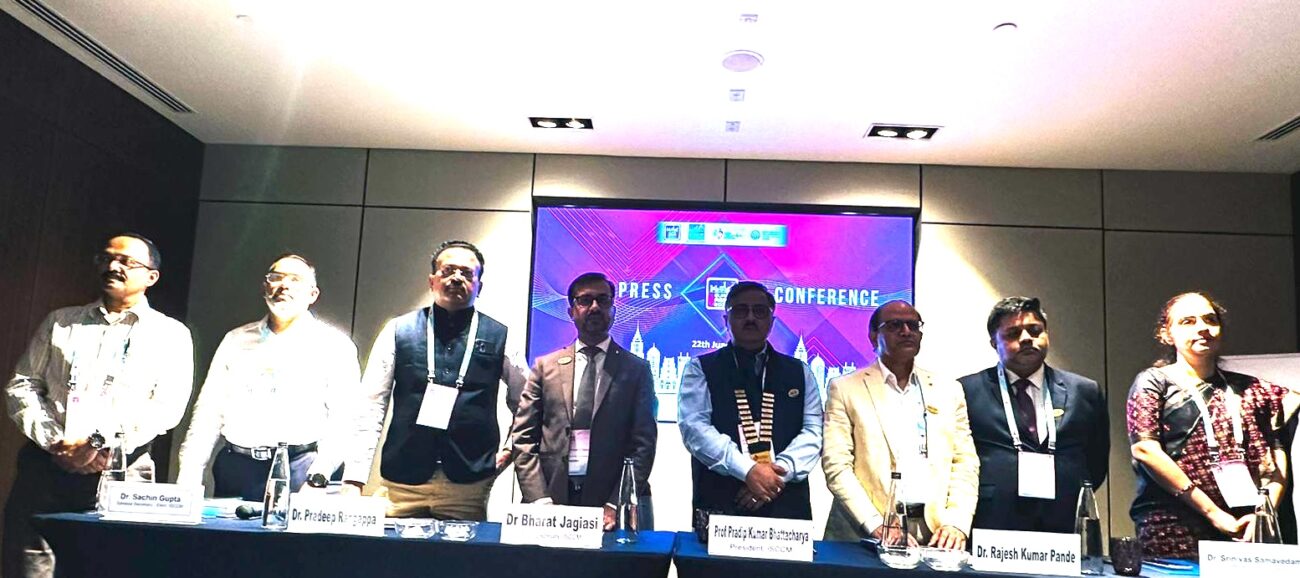Strengthening Fight Against Global Crisis – AMR: Experts View @EUROASIA 2024
Data suggests that 1.2 million deaths in India are due to antimicrobial resistance (AMR), with an estimated 10 million deaths by 2050 Experts emphasized the One Health approach and the pressing need for an Antimicrobial stewardship

Data suggests that 1.2 million deaths in India are due to antimicrobial resistance (AMR), with an estimated 10 million deaths by 2050
Experts emphasized the One Health approach and the pressing need for an Antimicrobial stewardship program
Antimicrobial resistance (AMR) is a critical global problem affecting humans, the environment, and animals, ranking among the top 10 challenges faced by humanity. During EuroAsia 2024, which witnessed participation from leading critical care specialists, experts shared concern over AMR and its increasing prevalence in India. Leading critical care experts such as Dr. Bharat Jagiasi, Dr. Pradip Bhattacharya, Dr Srinivas Samavedam, Dr. Pradeep Rangappa, Dr. Rajesh Pande, Dr Sachin Gupta, Dr. Bhuvana Krishna, Dr.Kartik Rao emphasized on the need for strengthening the fight against AMR and adopting a holistic approach of ‘One Health’ for improving antimicrobial stewardship.
To effectively address AMR, the adoption of a multifaceted approach is crucial. This includes the implementation of surveillance and tracking systems, antibiotic stewardship, and infection prevention and control measures. Addressing the media, Dr Bharat Jagiasi, General Secretary of ISCCM said “The resistance to antibiotics is leading to longer hospital stays, longer treatment and mortality. There is a need to aggressively strengthen the fight against AMR and adopt One Health stewardship practices to tackle the global AMR challenge. Implementing effective public campaigns can educate the public on the antimicrobials prescribed. It is necessary to improve and strengthen hygiene measures and prevent the spread of infections. Antibiotic resistance has accelerated the spread of resistant bacteria known as “superbugs,” which will put an immense strain on health systems and countries’ economies, which can result in increased hospitalizations and deaths.
Sharing the factors leading to AMR, Prof. Dr Pradip Bhattacharya, President, ISCCM stated, “The One Health concept highlights the critical need to control antibiotic consumption. Data suggests that 1.2 million deaths in India are due to antimicrobial resistance (AMR), with an estimated 10 million deaths by 2050. The medical fraternity must exercise caution in prescribing antibiotics to avoid unnecessary risks and should adopt a judicious approach through stewardship programs.” Excessive and inappropriate use of antibiotics is a key factor fueling the emergence of resistant bacteria, complicating the treatment of common infections and heightening the likelihood of severe outcomes and death. Apart from this, limited awareness among the general public and patients about AMR hinders effective prevention measures.”
Dr Srinivas Samavedam, President, Elect, ISCCM said, “Multiple stakeholders and each one has a role to play in AMR control. After COVID-19 specially Stewardship is needed which is the right drug, right time, right bug, and right dose. The patient needs 36 to 48 hours for any antibiotic to be effective., a little trust is required from the patients. However, the patients take a 2nd opinion and change dosage. Pharmacies are also required to adhere to the norms and putting a red strip on a medicine means that it should be sold with a prescription. It is also the industry’s responsibility to sell the highest level of antibiotics to the right audience and ISCCM has always been at the forefront of AMR’s battle
On solutions for a secure future against AMR, Dr Pradeep Rangappa, leading critical care specialist and former secretary, ISCCM said, “India is the 3rd largest consumer of antibiotics. 30 to 60% of the time, an antibiotic will be inappropriate and needs to be curtailed. The Indian government has created a national action plan to curtail antibiotic consumption. We have come out with guidelines on surveillance and how resistance patterns are progressing. India is in a serious situation, so checks and balances need to come in place at the pharmacy level.”
Emphasizing on the need for pharmaceutical companies to bring newer anti-infectives, Eminent intensive care expert and principal Director, BLK MAX Super specialty Hospital, Dr. Rajesh Pande said, “AMR needs to be tackled through a multi-disciplinary approach. Antibiotic consumption needs to be judiciously used both- inside and outside the hospital through monitoring over-the-counter medication of antibiotics. AMR prevalence is increasing, but unfortunately, the pipeline of new antibiotics is running dry. Pharmaceutical companies need to introduce more newer anti-infectives to treat the drug-resistant bacteria since the pathogens have developed resistance to majority of the current anti-infectives available in the market.”





